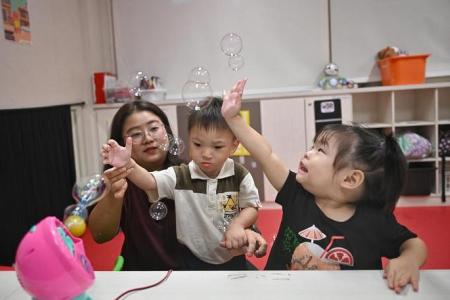Toys with adapted switches help kids with disabilities play
In 2021, when Ms Cheryl Chia started work as an occupational therapist, she watched as some children with cognitive disabilities struggled to play with some toys.
They could not play with them like other children do, as grasping or pressing small buttons posed a huge challenge.
Ms Chia, 28, looked for suitable toys online but found the higher cost to be unsustainable.
Finding inspiration in a moment of frustration, the employee at social service agency Awwa looked up videos on how to adapt toys into versions that her clients could play with.
After a month of research and experimentation, and two hours of fiddling with batteries and switches, she completed her first adaptive toy. The end product was a unicorn-shaped bubble blower that she had modified to include a large switch that children with disabilities would have an easier time playing with.
She said: “Seeing the joy and excitement on my clients’ faces when they interacted with it for the first time was incredibly rewarding.
“Many people forget that the main occupation of a child is to play!”
Modifying a toy now takes her only 10 to 20 minutes, down from two hours in the beginning.
Ms Chia and her colleagues now have 20 adaptive toys in their collection at the Awwa Early Intervention Centre in Fernvale Link, from soft toys like teddy bears, to trains and buses with large switches.
Mr Abhimanyau Pal, chief executive of social service agency SPD, said there are not many toys that are suitable for children with disabilities.
Mainstream toys may sometimes require actions such as grasping or pressing small buttons, which may be harder for children with disabilities.
Switch-adapted toys overcome some of the physical barriers and help children with disabilities be a participant in a play activity, rather than just being an observer, he said.
Early intervention professionals at SPD have been using modified toys and adapted switches in SPD’s early intervention programmes for infants and children since 2016. The devices help children with limited motor control participate in playtime, he said.
The organisation used to get the toys from overseas vendors, but it now adapts toys with the help of its Specialised Assistive Technology Centre and partners like non-profit organisation Engineering Good.
In 2019, Engineering Good was awarded the Our Singapore Fund for Digital Readiness by the Infocomm Media Development Authority for its projects, which include teaching people how to build switches to adapt toys.
Since then, it has trained more than 400 people to make such toys.
Get The New Paper on your phone with the free TNP app. Download from the Apple App Store or Google Play Store now


